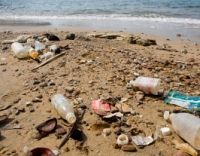

Data from beach clean-ups shows an increase of 9.5% of single-use plastic items on beaches in the UK and the Channel Islands from 2023 to 2024.
The Marine Conservation Society provided information for the report, which looked at waste picked up by volunteers during 2024.
Volunteers removed over 764,000 litter items from our beaches, weighing more than 16,800kg. The litter items found were varied but included plastic pieces, packets, caps and lids, plastic string and string, cord and rope.
The sources of the litter were also varied and estimated to be from the following:
On a positive note, since the introduction of carrier bag charges, data gathered by volunteers shows an 80% decrease of plastic carrier bags found on beaches. This highlights the power of policies and behaviour change in reducing our single-use plastic consumption. The average number of plastic bags per 100m of beach found in the UK took a drastic dive downwards after the carrier bag charge was introduced.
More than 15,000 volunteers completed over 1,200 litter surveys, allowing the Marine Conservation Society to identify common litter items, pollution sources and trends, and use this evidence to push for change. 92 miles of beach were cleaned as part of an effort to have cleaner, healthier and safer beaches for everyone.
Last year's litter data fed into the disposable cup consultation in Scotland and in the campaigning for Deposit Return Schemes (DRS) – which England and Northern Ireland have now passed legislation to start implementing. In Wales, the data highlighted the need to include glass in its DRS, which it is hoping to do.
Lizzie Price, the beachwatch manager at the Marine Conservation Society, said: "Thanks to over 15,000 volunteers last year, the data from our beach cleans is clear: plastic pollution remains a huge problem for our marine environment. We urgently need more policies to reduce single-use plastics and ensure better waste management. Everyone has a role to play in protecting our oceans, and we urge the public to support stronger action against plastic waste, as well as cut down plastic from their everyday use."
For more information on this subject, see: